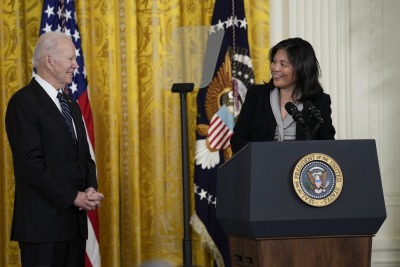
Legislative Updates – March 6, 2023
Julie Su Nominated for Labor Secretary

This Week President Biden announced that he will nominate Julie Su to be Secretary of Labor, replacing Sec. Marty Walsh, who is departing to lead the NHL player’s union. Su has served as Deputy Secretary at DOL since her Senate confirmation in 2021 on a party-line vote, where she faced Republican opposition stemming from her work as California’s labor commissioner. Senate Majority Leader Chuck Schumer (D-NY) said her nomination would be considered very quickly, and her nomination hearing is expected in the Senate HELP Committee as early as this month.
FY 24 Budget
The White House will release President Biden’s FY 24 budget proposal on Thursday, March 9. The budget request is expected to include brief details on each agency’s request, spending and tax figures, and summary tables. The remaining explanatory documents, appendix with proposed appropriations language, analytical perspectives, supplemental tables, and agency justifications are expected to be released on Monday, March 13.
House Republicans plan to introduce their budget resolution in April and to vote on the budget resolution by April 15, the nonbinding deadline for Congress to adopt a budget. House Budget Chair Jodey Arrington (R-TX) is considering including the assumption of a budget cap agreement in the resolution, but noted he would defer to Speaker Kevin McCarthy (R-CA) on that issue. Speaker McCarthy has pledged to write the FY 24 spending bills at the FY 22 levels, which would require $130 billion in cuts. Support for the House budget resolution is expected to break along party-lines.
The Senate may not adopt a FY 24 budget resolution this year. Senate Budget Chair Sheldon Whitehouse (D-RI) said he would wait to see the President’s budget proposal and the House’s budget resolution before deciding whether to write a budget resolution, which is not required and can be fraught with political complications. Senate Democrats may choose instead to prioritize reaching a topline spending agreement, which Senate Appropriations Chair Patty Murray (D-WA) and Sen. Susan Collins (R-ME) are working towards.
House Appropriations DOL Budget Hearing
On Thursday, March 9, the same day the President’s budget is to be released, the House Appropriations Labor-H Subcommittee will hold a hearing on the FY 24 budget request for DOL with outgoing Secretary of Labor Marty Walsh.
FY 24 Appropriations
The Senate Appropriations Committee met yesterday. After the closed-door meeting, Chair Patty Murray said she is working with Ranking Member Susan Collins to develop a topline spending figure for FY 24, and noted they will be pursuing an aggressive roadmap to get appropriations bills done in a timely manner.
Ranking Member Collins said she believes that the Senate will most realistically vote on the bills in “minibus” packages in which two or three of the twelve spending bills will reach the Senate floor together. Appropriators wish to strike bipartisan agreements, and reportedly Senate Minority Leader Mitch McConnell (R-KY) indicated his support for the plan. Senate appropriators are planning to start marking up the spending bills in May.
In the House, Speaker Kevin McCarthy has pledged to write the FY 24 bills at the FY 22 levels, which would require $130 billion in cuts.
Debt Ceiling

There have been few developments on debt ceiling negotiations. Speaker McCarthy this week noted that President Biden has not reached out to him since their initial meeting over a month ago. One option Republicans are considering is to pass a short-term suspension of the debt ceiling to pair the timing of the debt ceiling deadline with the end of the fiscal year on September 30. House Appropriations Chair Rosa DeLauro (D-CT) said she opposes that strategy and is concerned it could lead to a government shutdown. The federal government began using extraordinary measures to pay its bills upon reaching the $31.4 trillion borrowing limit in mid-January.
Earmarks
The House and Senate have each released guidance for FY 24 earmarks. Like in the prior two years, earmarks in the House are termed Community Project Funding and earmarks in the Senate are termed Congressionally Directed Spending. Unlike the last two years under the Democratic majority in the House, for FY 24 House Republicans have decided to eliminate earmarks for three of the bills: the Labor-H, Financial Services, and Defense bills. Labor-H earmarks were the second-most requested account for Democrats in FY 22 and FY 23, and the fifth-most requested account for Republicans. Their elimination was due in part to concern from conservatives over FY 23 earmarks related to LGBTQ/transgender services and other social services spending, and the desire to garner support among all House Republicans.
Each House and Senate office set their own deadline for when requests must be submitted to their respective offices and some deadlines are approaching soon. In the Senate, earmark requests from Members of Congress for the Labor-H bill are due on April 13. In the House, earmark requests from Members of Congress for the Transportation, and Housing and Urban Development, and Related Agencies bill are due on March 31. It remains unclear whether earmarks will be included in any eventual FY 24 spending bills that can pass Congress. House guidance is here and Senate guidance is here.
House Ways & Means Committee Advances Pandemic Unemployment Insurance Fraud Bill
On Tuesday, the House Ways & Means Committee advanced H.R. 1163, the Protecting Families and Victims of Unemployment Fraud Act, on 20-17 party line vote. The bill incentivizes states to recover fraudulent Unemployment Insurance ( (UI) benefits made during the pandemic by allowing states to keep a quarter of fraudulent UI payments they recover,. The bill would also increase the statute of limitations for UI fraud from five years to 10 years. The bill would repeal $2 billion in funding for preventing fraud and other UI-related services. Democrats said the bill didn’t adequately modernize state UI systems and could penalize millions of individuals who received improper payments but did not have fraudulent intent. Republicans rejected more than a dozen Democratic amendments to shield various groups from being subject to state recovery efforts.
DOL ETA State Apprenticeship Expansion Formula Forecasted Funding Opportunity Announcement

DOL’s Employment and Training Administration projects it will post its “State Apprenticeship Expansion Formula” grant opportunity on March 14, with a closing date of April 23. ETA will provide $85 million via 53 state grants. The FOA will support a coordinated, national investment strategy that aims to strengthen and modernize the Registered Apprenticeship Program (RAP) system by providing funding to support State capacity and State planning to create new RAPs while also driving system innovation and reform.
DOL ETA Pathway Home Round 4 Funding Opportunity Announcement
DOL’s Employment and Training Administration released its Pathways Home 4 FOA yesterday. It will provide 15 grants up to $4 million for adult re-entry programming, with the goal of reducing the window between release and employment for participants. The FOA is available here and and our summary of the FOA is available here.
Commerce CHIPS Funding Opportunity Announcement
On Tuesday, the Department of Commerce released its first CHIPS and Science Act funding opportunity. The CHIPS Incentives Program – Commercial Fabrication Facilities grant aims to boost domestic semiconductor manufacturing through applications for projects for the construction, expansion, or modernization of commercial facilities for the front- and back-end fabrication of leading-edge, current-generation, and mature-node semiconductors.
Applicants must commit to developing and maintaining a highly skilled, diverse workforce, including by outlining their plans to hire economically disadvantaged individuals. In addition, applicants are encouraged to work with government organizations, educational institutions, labor unions, industry associations, and other strategic partners to meet the needs of the semiconductor industry in their region. Any applicant requesting more than $150 million in funding must provide a plan for access to affordable, accessible, reliable, and high-quality child care for both facility and construction workers. Press release here, fact sheet here, and workforce fact sheet here.
Not a member? Join today.
Members of the American Workforce Coalition gain access to exclusive content and events, including:
- Monthly Jobs Reports
- Legislative Analyses
- Peer-to-Peer Collaboration
- Access to Experts & Innovators
Already a member? Login